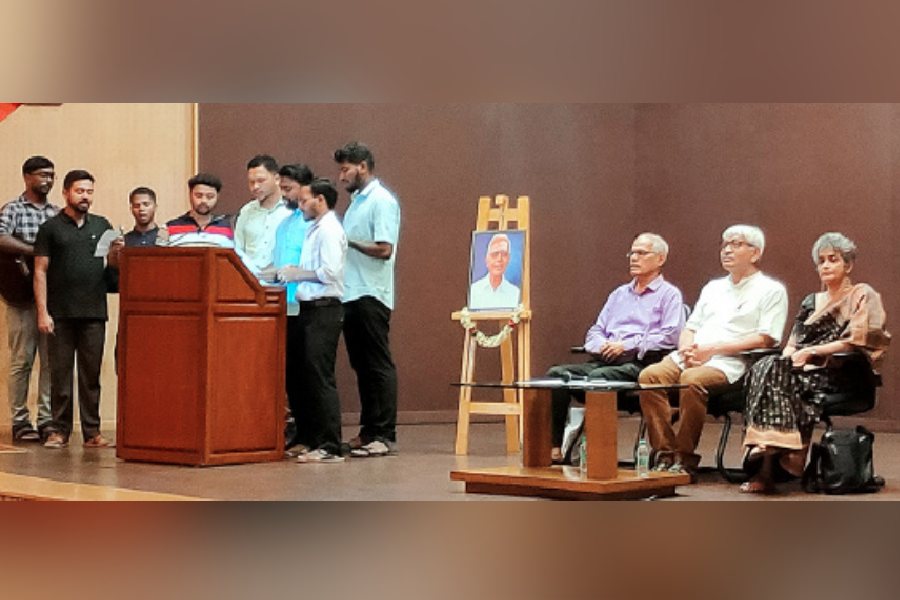The second death anniversary of Father Stan Swamy, who died in custody while awaiting trial in the Elgaar Parishad-Maoist links case, was commemorated with a panel discussion on “Civic Literacy and Political Participation” at the Jawahar Bhawan auditorium in the capital on Wednesday.
Swamy, an 84-year-old Jesuit activist from Jharkhand, died of post-Covid complications while in judicial custody in Mumbai. He was one of the 16 intellectuals, academics, lawyers and activists arrested for the Elgaar Parishad-Maoist “plot”. Eleven of them are still in prison, and one under house arrest, although the trial is yet to begin.
Speaking at the event, Jawaharlal Nehru University professor Nivedita Menon explained how the Constitution today had been a pole star for dissent.
She said: “A study of the debates in the CA (Constituent Assembly) shows that it reflected a variety of political opinions from Left to Right, emerging as it did from a mass anti-imperialist struggle, and it tried to balance many opposing values — individual and community, equality and special provisions for historically disadvantaged groups, the drive towards industrialisation and rights of the peasantry. The Indian Constitution, thus, does not express a singular will and a singular order.
“The mid-20th century moment in which it emerged was very different in time and space from that which produced the constitutions of the West, which marked a closure of, and an end to political ferment. The Indian Constitution, on the contrary, was seen by all those who participated in its production as the beginning of a journey towards what the Preamble promised.”
On the struggles over citizenship today, Menon said: “I suggest we need to recognise that India is a collection of minorities, not a ‘Hindu-majority’ country…. While all strands of nationalism, including the anti-Hindutva mainstream ones, accepted unquestioningly that a ‘Hindu’ community actually existed, it was only B.R. Ambedkar who declared that Hindu society is a myth. He pointed out that the name ‘Hindu’ was given by outsiders to refer to all those who lived in this land of the Sindhu river, as they did not have a common name for themselves, and did not perceive themselves as a single community. Ambedkar asserted that ‘Hindu society as such does not exist. It is only a collection of castes’.”
She added: “Indian secularism has to learn that within its space multiple religious and other identities will now reside, and stake claim…. While reasserting the Constitution as The Book of which we are The People, India has to learn new ways of engaging with religious identities in the public domain as long as they assert constitutional values, even if, perhaps, in hitherto unfamiliar ways.”
To revitalise citizenship, Menon prescribed: “We have to adopt a political practice that questions the very legitimacy of sealed national borders that we have come to take for granted over the last century. National border regimes must be opened up as well as the labour markets organised through them.”
She concluded: “It has been evident from the beginning of the enterprise of capitalist transformation that the project cannot succeed without the massive backing of the modern state with all its coercive resources…. All over the globe, the pandemic has sparked some extraordinary reflections — on the future of capitalism and anti-capitalism, on ecology, democracy, on representative government, on collective action.”
Delhi University professor Apoorvanand said: “The Preamble to the Constitution talks about achieving certain ideals, not that these had already been achieved: neither equality nor justice, independence nor fraternity…. The members of the Constituent Assembly recognised that these ideals had to be achieved and it could not be done without fraternity.”
He added: “This was a much-respected ideal until the last few years after which it is being said that: why are you part of the anti-CAA agitation when you are not a Muslim? It must be a conspiracy!”
The effect of this, Apoorvanand said, was that in the initial days of the protests by the farmers and the wrestlers, the farmers had shunned students and the wrestlers had stayed away from Opposition politicians in order to gain legitimacy as an acceptable protest.
“This is against the ideals of the Constitution which wants us to walk together in our journey…. Now we are called andolanjeevi (a term used by Prime Minister Narendra Modi for dissenters)…. What was the need for Stan Swamy to stand with the Adivasi movement? This is the question in the minds of many today,” he added.
Apoorvanand continued: “Today in several places of India thousands of people are remembering Stan Swamy like we are, and remembering this education of citizenship that never ends. Some want to lock up this university of citizenship that walks on the roads. I want to tell them that the students and teachers of this university are all around you. They can’t be sacked, nor rusticated or expelled. They can only be jailed or killed.”
Lancy Lobo, a Jesuit and professor emeritus at the Indian Social Institute, said: “Stan taught us that it is possible for Jesuits to translate the gospel manifesto into action.”










